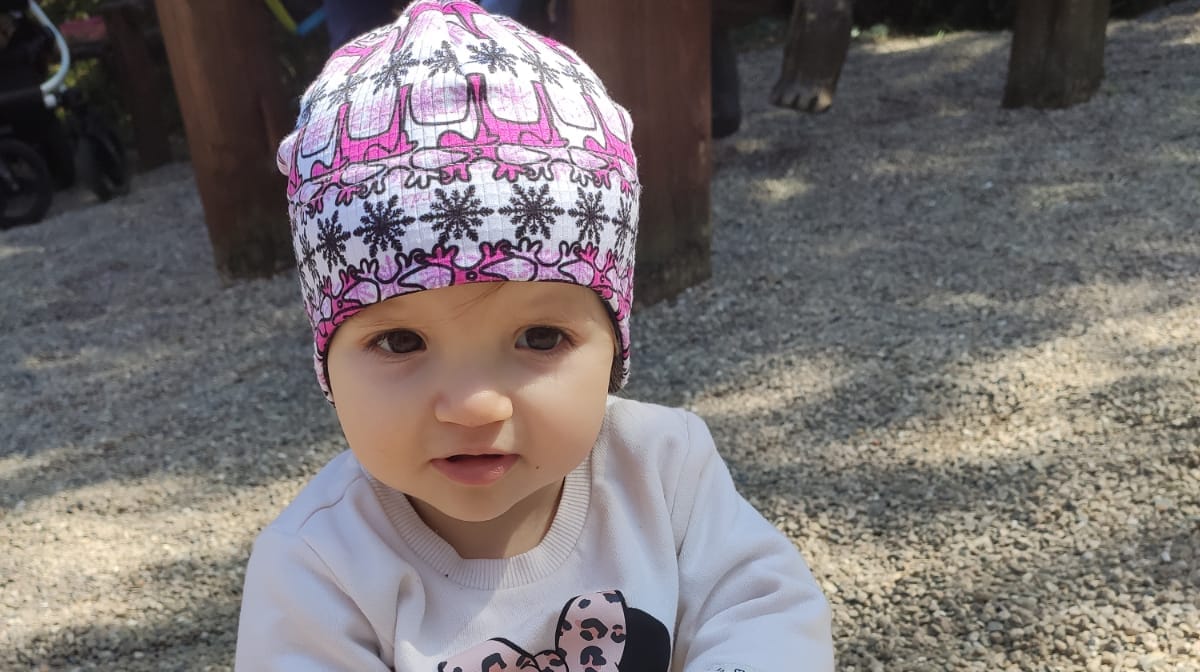Visiting Majdalenka
Some topics just take you by the heart. When we learned about spinal muscular atrophy, we decided to seek out more information and ways we can help.
Thanks to this, we met one Saturday in February to visit a little girl named Majdalenka in Teplice, where she recently moved with her mother. Majdalenka suffers from spinal muscular atrophy of the 2nd type and we, Tlusta Cara together with our VIP guest, went on our first introductory visit to see what we could help with.

What is SMA
What is spinal muscular atrophy? Spinal muscular atrophy, abbreviated SMA, is an inherited genetic disease manifested by poor communication between the brain and muscles through the spinal cord. The muscles gradually atrophy because of this, causing a whole host of other problems.
"SMAčci", as children suffering from SMA are termed in czech slang, have trouble controlling their limbs and even just learning to walk, to keep their head from falling, and in the worst case even to breathe. But they are not intellectually impaired in any way, quite the opposite.
SMA is divided into four types based on the age at which symptoms begin to appear. The first two are by far the most common and affect about three-quarters of affected children. Yes, children. In fact, spinal muscular atrophy of the first and second type manifests itself in children up to six months and two years of age, respectively. The third type manifests itself in preschool and school-age children, and the fourth type affects adults.
And how is SMA treated? None of the currently known treatments reverses pre-existing damage and do not cure the disability completely. However, they can stop the progression of the disease and the deterioration should no longer continue.
In the Czech Republic, Spinraza has been registered and used for treatment since 2017, the gene therapy Zolgensma has been available for specific use since 2020 and Evrysdi has been used since 2021. Other alternatives are in testing.
Spinraza is given by spinal puncture (injection into the spinal canal) every 4 months and Zolgensma only once as an infusion into a vein to replace the damaged gene with a synthetic one. However, the patient must meet very narrow criteria (age, weight, antibodies) to be eligible for gene therapy treatment at all. Treatment with both Spinraza and Zolgensma is already currently covered by health insurance companies.
To Majdalenka
David Matásek and his five years old son Toník joined us for a visit to Majdalenka. David is a film, TV and theatre actor known for a series of comedies about the life of a doctor and an incorrigible romantic (How the World Loses Poets, How Poets Taste Life, etc.), you can regularly see him in the lead role in the crime series Cop or on the stage of the National Theatre as a member of the local drama group. A lesser known fact about him is that he is also devoted to charity, and he is not indifferent to Majdalenka's story. We appreciate David very much and we are glad that he decided to visit Majdalenka with us.
We arrived at the pleasant housing development in Teplice, where Majdalenka and her mother had recently moved to, on Saturday before noon and soon we were greeted at the door by Majdalenka, her mother and grandmother and her cat Vanessa. We shook hands, handed over gifts and my colleague Veronika and David's son Tonik went to explore Majdalenka's room with Majdalenka, her grandmother and Vanessa, while we stayed in the kitchen with David and Majdalenka's mother, drinking coffee and telling Majdalenka's story.
The story of Majdalenka
Majdalenka is a cute and intelligent almost three years old girl with blonde hair, big brown eyes and a positive outlook on the world, who loves to play with Vanessa. Since she was a baby she had problems with movement - she had a hard time crawling and didn't want to lie on her tummy. So her mother set out to find out what could be wrong, and Majdalenka underwent a long series of examinations. Majdalenka was diagnosed with spinal muscular atrophy type II on August 13, 2021 at Thomayer Hospital in Prague.
It was a shock to her mother. Fortunately, it was possible to start treatment with Spinraza immediately, which relieved Majdalenka and improved her outlook. In 14 days she received a second dose of Spinraza and then came a surprise in the form of the insurance company informing her mother that Majdalenka would be reimbursed for gene therapy.
Gene therapy is administered in a single infusion that does not need to be repeated and aims to replace the damaged gene with its synthetic variant, unlike Spinraza which needs to be administered every 4 months by spinal tap, which is definitely not a pleasant experience. Majdalenka underwent gene therapy under her mother's supervision on 9 September 2021 with a few adverse symptoms such as lack of appetite and fever, but managed to overcome them and is now cheerful again.
Each of the SMA children is affected by the disease in a slightly different ways. For example, some can walk a little, but have trouble keeping their heads upright or have trouble breathing. Majdalenka has affected part of her tummy. Because of this, she has problems with digestion and her motor skills are a little strange, because she compensates for muscles in her abdomen that are not working properly. She can't stand up or walk yet, but she climbs and explores the apartment she and her mom live in very actively on all fours.
Where to find Majdalenka and how to help

Account number: 2402029307/2010
IBAN: CZ9820100000002402029307
BIC/SWIFT: FIOBCZPPXXX
Rehabilitation and equipment
In order for Majdalenka to make further progress, a stay in the specialized rehabilitation center Hájek is needed. In this centre they focus on patients with such specific problems, but it is necessary to go there regularly and repeat the rehabilitation for a long time. However, a visit to the Hájek centre is certainly not a cheap affair, one fortnight's rehabilitation stay costs CZK 80,000 and Majdalenka ideally needs to repeat it at least four times a year.
Majdalenka's prognosis from the doctors is that if she is lucky, she will hopefully be able to get up and walk, the specialists at Hájek think that with intensive therapy they will be able to teach her to walk short distances (e.g. to go to the toilet on her own).
Another problem of little Majdalenka is digestion. Due to problems with the muscles in her tummy, she needs a special wheelchair/bed to keep her in the correct vertical position to support the functioning of her digestion. In addition, even when she is not in the Hájek, she needs non-specialized rehabilitation, so she also undergoes regular maintenance rehabilitation in Teplice.
Sitting is also difficult for Majdalenka. Now she is waiting for a special chair, which she needs because she needs to be held in the right position due to her flabby abdominal muscles, so that sitting does not deform her spine and cause scoliosis, which could even make sitting impossible as she gets older.
Riding out is also a problem. Majdalenka has one pushchair, but it is an indoor pushchair, which is not designed for riding on uneven terrain and over curbs. The only wheelchair the insurance company offered for outdoor use is a wheelchair for larger children, which would be difficult to place and support Majdalenka in, as would a chair. A specialized wheelchair that meets her requirements is another big expense that Majdalenka's mom is currently dealing with
Helping Majdalenka
Majdalenka and her mother live in Teplice in a new apartment near Majdalenka's parents and the rest of the family. The family has become very close around Majdalenka and thanks to their efforts, many people from Teplice are helping them.
Majdalenka's mother's brother helped set up a transparent account, his soccer team auctioned off jerseys and paid for some expenses, and her father, who is a vice-principal at one of the local schools, found additional support through family friends.
The O2 Foundation helped with a monetary donation for the rehabilitation stay, and the Good Angel sends a monthly donation to cover other expenses. Thanks to this, Majdalenka has currently paid for 3 more stays in Hájko, hippotherapy (riding on a specially trained horse that helps by moving its back in step) and the aforementioned special wheelchair/bed to support blood circulation and digestion.
Help Early Care Organisation was invaluable, especially in the beginning, when after the diagnosis was made at the Thomayer Hospital in Prague, they visited the mother and Majdalenka and provided them with initial help. The organisation still sends staff to help out once a month for a few hours.
What's next?
Majdalenka has had successful gene therapy and is very mobile, inquisitive and intelligent. She enjoys the company of children and is playful and friendly, she and David's son Tonda spent a pleasant few hours playing in her room. As we discovered, she is also technically proficient. She hugged the teddy bear for a while and then asked us to break it apart for her, started playing with the settings of its sounds and lights and learned to switch it on and off in no time.
Majdalenka's mother is an extremely brave woman, she didn't complain about her fate at all and it was obvious that she is actually stupid to ask anyone for money, although they will of course need it in the future. She wants to lead Majdalenka to as much independence as possible.
My mother's side of the family is close-knit, the residents of Teplice are helping out, and thanks to requests they receive donations from small and large foundations. They live in a nice apartment in a housing estate overlooking Doubravka, grandma and grandpa live a few streets away and the most important care is arranged for some time, although what will happen next year is still in the stars.
What is currently needed is to find a specialized wheelchair for Majdalenka for outdoor use, to ensure that she continues to receive the most intensive care and regular visits to the Hájek Rehabilitation Centre. This is because Majdalenka is at an age when she is developing intensively, and the more intensively she exercises and works to improve her abilities until the age of six, the better her chances of being able to stand up and perhaps walk for a short time.
To ensure this goal, Majdalenka's mother could use some help with the bureaucracy. Foundations donate based on completed and submitted forms requesting assistance. However, each of these forms is slightly different and requires a different level of detail and range of information, so it is not possible to fill them out once and then copy them. So it would be ideal to find someone who could help the family with donation requests.
In addition, help with cleaning and housekeeping would be helpful to my mother. However, as she says, she cannot imagine the presence of a nanny. After the rehabilitation she is always happy when she and Majdalenka are together and she can fully devote herself to her.
We would like to help Majdalenka with getting a wheelchair and with arranging help with paperwork and forms. We are taking further steps in this direction and have formed a sincere friendship with her and her family.
Majdalenka's transparent account

Account number: 2402029307/2010
IBAN: CZ9820100000002402029307
BIC/SWIFT: FIOBCZPPXXX
Art group Tlustá čára, Author: Jan Hůlek, Proofreading: Anna Jechová, Ivana Kočík
